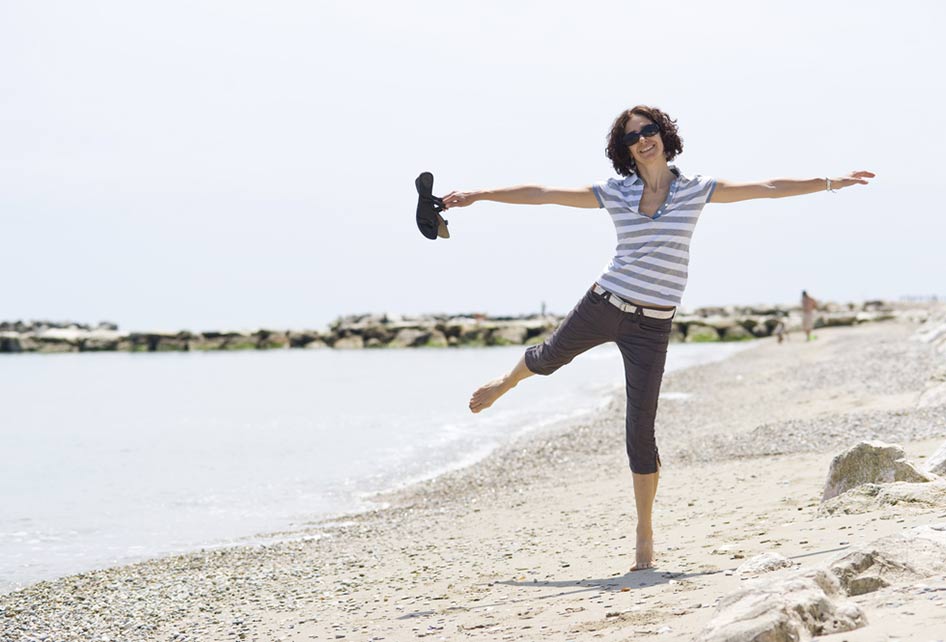Recently, I spent time with a woman in her 70’s, who is very fit and capable. Nora has had problems with motion sickness (in cars and boats) for most of her adult life, and the occasional bout of vertigo. But over the past couple of years, the vertigo has gotten worse, exacerbated by cataract surgery. Her ophthalmologist told Nora that her brain hasn’t made the adjustment to her new vision. Nora recently fell backwards because of dizziness, while washing windows. This event left her feeling vulnerable and scared—and afraid of falling for the first time in her life.
What was most surprising to me was observing the effect that all this has had on Nora’s ability to walk normally. Instead of the usual spry, upright walk she has always enjoyed, Nora now looks down almost continuously and doesn’t swing her arms. The result? For the first time since I’ve known her Nora moves like an old woman!
When I asked her about this, Nora said she’s trying to keep her head stable so that she doesn’t feel the vertigo. That’s certainly understandable. And yes—she is consulting a specialist who uses the Epley maneuver and other modalities. But there is a better way to deal with the problem, which is in her vestibular system—the part of the brain that deals with balance and spatial orientation.
Seeing Nora walk, I was reminded of what I learned from Joan Vernikos, Ph.D., former Chief Life Scientist at NASA and author of Sitting Kills, Moving Heals. Vernikos trained astronauts for space flights, including the flight John Glenn took when he was 77 and head of the Senate Subcommittee on Aging. Vernikos noted that when astronauts return from space, they walk with a wide-based gait, without swinging their arms. In fact, they “walk like old people” even though they are the fittest of the fit and in the prime of their life.
The problem? Lack of gravity in space—and lack of a horizon to orient themselves to—results in deterioration of vital connections in their vestibular systems. Vernikos reports that she once had to catch a young astronaut who had closed his eyes and began to tilt forward because his balance was off. Vernikos caught him just as he was about to hit the floor!
The balance problem goes away on its own after being back in the Earth’s gravitation field, as long as the astronauts go about their daily activities and fitness routines—all of which cause them to orient themselves in relationship to gravity. If they had tried to stabilize themselves simply through immobilizing their bodies and being afraid of falling, the deterioration of their vestibular systems would have continued.
As a result of her work with astronauts, Vernikos realized that what we call the aging process—including walking like an old person—actually has nothing to do with a person’s age. It is simply that as people get older, they stop moving their bodies through space in ways that maintain the wiring of their vestibular systems.
Happily, that can be changed at any age and stage. You just have to be willing to challenge and upgrade your vestibular system. I told Nora to stand on one foot and close her eyes. She was, of course, unable to balance for more than a second. I suggested that she do this at least five times a day—on each foot alternately. I suggested she make it part of her life, advising her to practice balancing in the shower, while waiting in line, while watching TV, just before going to bed—you name it.
It’s easy. No equipment necessary. And don’t wear heels while doing it, otherwise it’s way too difficult. And yes, Nora might have to work through the dizziness to overcome it. The alternative is for her balance and equilibrium to continue to deteriorate from lack of use.
I took my own advice, and within one week, my balance had improved dramatically. Now I can stand on one foot, close my eyes, and stay there for nearly a minute. And the same is possible for nearly everyone. That’s because of a well-known principle of brain function: Neurons that fire together wire together. When you challenge your vestibular system by balancing regularly, it functions better and better. I have noticed this repeatedly in Tango as well.
Your balance will become better as long as you challenge it regularly. — C.N. Tweet this!
Here’s your take home message: You never need to walk like an old person! You just have to stay poised and balanced—and keep polishing the wiring in your brain and body that makes it possible. So swing your arms, look forward toward the horizon, and walk confidently into your future!



Thank you for your many articles on woman’s health, I do have one of your 1st books on menopause just to understand what to expect. I am now 76 and about 6 months ago had a hospital stay due to loosing my balance. Not being able to stand with out something stable to hang on to. After the usual test, scans they just couldn’t find a cause. As time past I found that I had a gallblatter infection that was affecting my liver as well and finally I have had cataract operations on both eyes in the last month. I gradually got my balance back over time but I am definately going to try the standing on either foot 5 times a day. The last time I experienced the same type of imbalance was in l986 when it was discovered that I had thyroid cancer which one half was removed. Is it possible that my body was trying to warn me of health problems? Thanks again Christiane for researching and passing on all this information to women.